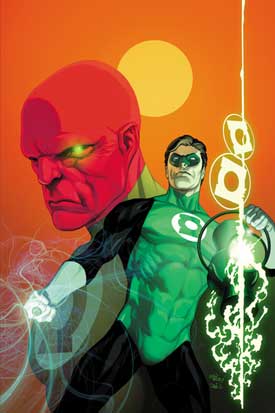Movies /
Comics To Film News
Green Lantern is DC Comics’ Iron Man
By Hervé St-Louis
May 25, 2008 - 13:32
When Iron Man was announced as Marvel Entertainment’s first self produced film release, some, like this author, doubted that this was a safe move for the comic book publisher who yearned to become a film production company. Yet, Iron Man has proven that he is not the second string character that many thought he was. Instead, Iron Man now officially joins the upper echelon of Marvel Comics’ characters that inspire viewers and readers. Can the same be said of DC Comics’ Green Lantern franchise?
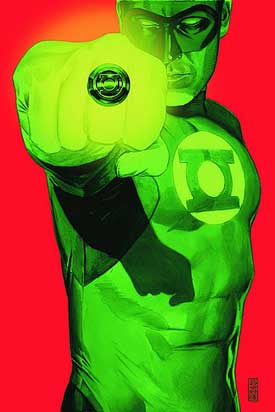 |
| Green Lantern Hal Jordan |
History
Green Lantern is one of DC Comics’ oldest characters. First appearing in
All-American Comics #16 in 1940 as engineer
Alan Scott, Green Lantern, created by artist
Martin Nodell and writer Bill Finger. He was a modern day Aladdin, wielding a magic ring that could create anything he could think about. Dressed in red and green, this Green Lantern, known today as the
Golden Age Green Lantern, soon became one of All-American Publications’ most popular characters, earning him his own series, published several times per year, from 1941 to 1949.
Alan Scott was part of the
Justice Society of America, the first super hero team. Because he earned his own series, he soon became an honourary member of the series, like the
Flash. Alan Scott appeared on the cover of several comic books along with fellow Justice Society members the Flash and Wonder Woman, who were the most popular characters from the publisher before they would merge with sister company, National Comics, which published Superman and Batman.
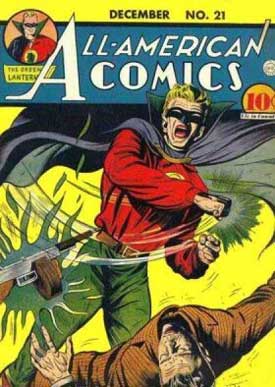 |
| All-American Comics #21 - Green Lantern Alan Scott |
In 1959, Green Lantern was re-imagined as test pilot
Hal Jordan, appearing in
Showcase #22. This new Green Lantern had a costume redesign and was part of the Green Lantern Corps, a space-based police organization headed by the Guardians of the Universe, little blue men with red robes with vast mental powers and protector of the giant green lantern on planet Oa. Green Lantern was the second character from DC Comics’ stable to undergo a reboot in what would be known as the Silver Age of American comic books.
The Flash, was modernized in
Showcase #4 published in 1956.
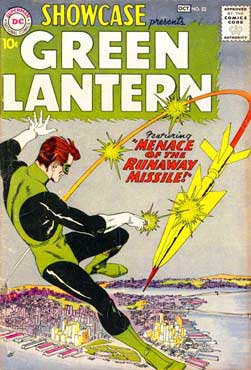 |
| Showcase #22 |
Like the previous Green Lantern, Hal Jordan joined with the premier super hero group of his era. As a founding member of the
Justice League of America, Hal Jordan became one of the premier characters of the company and one with the most complex set of secondary characters and villains. The concept of replacement Green Lanterns, allowed DC Comics to cast other characters as Green Lantern for periods of times. The first was
Guy Gardner, introduced in 1968 in
Green Lantern # 59, Volume 2, as the alternate Green Lantern candidate that had been passed over in favour of Hal Jordan who was closer.
When writer Dennis O’Neil and artist Neal Adams modernized the Green Lantern series in the
Green Lantern #76 in 1970, they introduced a new black Green Lantern that would answer the question an old black man had asked Hal Jordan about why he did not help them more. John Stewart, introduced in
Green Lantern #87 in 1971 was another back up Green Lantern to Hal Jordan and like Gardner, would serve in the Justice League at times where Hal Jordan wasn’t a member.
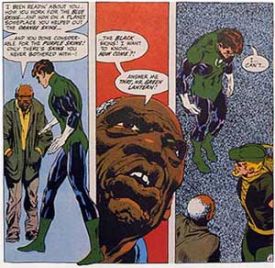 |
| Green Lantern #76 "What about the black skins?" |
Green Lantern in Other Media
For the creation of the
Justice League cartoon series by Cartoon Networks in 2001, John Stewart was chosen instead of Green Lantern
Kyle Rayner who had been the main Green Lantern featured in comic books since 1994 and had appeared in earlier Superman cartoons set in the same continuity. This move created a controversy with some comic book readers saying that Stewart was included only because he was black. Nevertheless, the creators of the Justice League series quickly developed the character differently from his previous comic book appearance and had made him one of their most popular characters.
Unlike other main DC Comics characters, Green Lantern has never had a live television series, a cartoon series or even a film of his own. He has appeared mostly in the
Super Friends and Justice League related-series, such
Justice League New Frontier. In many instances, such as New Frontier, Green Lantern was a central character. There are plans for a Green Lantern movie set to appear in 2010.
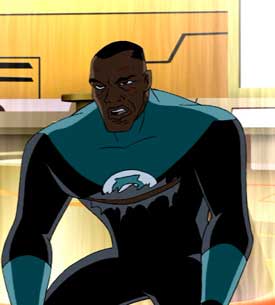 |
| John Stewart - Source: www.worldsfinestonline.com |
Of all major DC Comics’ characters, Green Lantern, and to some extent, Green Arrow, is the only one that has not starred in his own productions. Green Lantern is often mentioned right after the Flash in terms of major DC Comics characters after Superman, Batman and Wonder Woman. Without any doubts, Green Lantern has entered the popular culture. He is even referred to in
The Simpsons cartoons. However, unlike the Flash, the average North American knows nothing about the character.
Part of the problem comes from the multiple main Green Lanterns vying for first billing. Is Hal Jordan, the most popular Green Lantern character the one that DC Comics should focus on or should it be Kyle Rayner, which from 1994 to 2004 was Generation X’s Green Lantern? Even in the cancelled Justice League live film, John Stewart was the character that was supposed to be the Green Lantern.
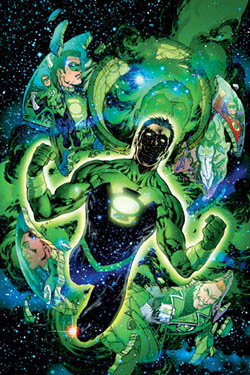 |
| Kyle Rayner - Ion |
The situation has not been resolved in the comic books either. Special designations have been assigned to various Green Lanterns to not diminish their status in the eyes of their supporters. For example, Guy Gardner is now known as the Green Lantern #1. Kyle Rayner was known as Ion, a super Green Lantern. John Stewart is frequently the Green Lantern assigned to the Justice League comic book series. Even Alan Scott is revered as the first Green Lantern, and although he did not bill himself as Green Lantern from 1994 to 2003, he called himself Sentinel.
DC Comics has long recognized that the Green Lantern property is a lucrative one. With so many human Green Lanterns and thousands of alien ones, there is a Green Lantern for everybody. By creating the
Green Lantern Corps, DC Comics also created a Jedi-like organization before
Star Wars was an idea in creator George Lucas’ mind. The Green Lantern history is complex and filled with characters and drama. As a toy franchise for DC Direct,
Green Lanterns statues, props and action figures have proven very successful and easily lend themselves to a collectors’ property because of the diversity of characters and concepts.
 |
| Green Lantern Power Battery |
Green Lantern VS Iron Man
Yet I will argue that Green Lantern, like Iron Man before his film release, are still B characters begging to leave the shadow of more established properties.
Aquaman, often dismissed as a guy who talks to fishes, is better known in popular culture than Green Lantern. Green Lantern is a bit more complex to explain and the name does not evoke a clear concept. Although called Green Lanterns, it is their rings which are their most known artefacts. The lanterns that Green Lanterns carry are used in their private lives but not in public.
Iron Man was a member of the Marvel Comics super hero team, the
Avengers for years. Like Green Lantern, he was featured in many outside adaptations of the Avengers outside of comic books. Yet, he was never treated by Marvel Comics before the film’s announcement as a property with that could make the company as much money as say,
Spider-man. Following initial responses to the film, there is no doubt that from now on Iron Man will always get top billing with other Marvel Entertainment franchises, such as the
X-Men and the
Fantastic Four. If he had ever been the butt of jokes or stand up comedians, like fellow comic book character Aquaman, this will change now.
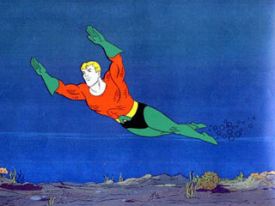 |
| Super Friends' Aquaman |
Meanwhile Iron Man is probably overshadowing the two other characters in whose league he was often part of. Both
Thor and
Captain America appear to be minor characters compared to Iron Man today. In the case of Green Lantern, for years, he has been overshadowed by
Aquaman and
Flash, although he was often considered to be in the same range or popularity.
Yet, like Iron Man, Green Lantern has had important storylines that defined the character. While Iron Man was a weapon’s maker, an industrialist who had more in common with typical villains than super heroes, he has been plagued with personal challenges like alcoholism, depression and bankruptcy. Various Green Lanterns have seen their loved ones transformed into their arch nemeses, seen them slaughtered by opponents, been imprisoned and fall from grace following judgment errors.
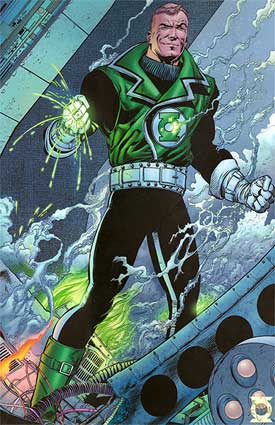 |
| Guy Gardner |
In terms of classic storylines, Iron Man had his alcoholism, his armour wars and the fight for the survival of his company. Green Lantern Hal Jordan, for example, along with best friend
Green Arrow, toured America in a pickup truck trying to understand the country during times of changes.
Iron Man’s multiple armours offer a fertile ground for multiple action figures, props and play sets. Green Lantern’s multiple main characters, villains offer the same.
Both comic books series featuring Green Lantern and Iron Man are good sellers for their publishers. Like Iron Man, the thought of an Avengers’ series or a Justice League series without a Green Lantern is unheard of. He’s considered one of the main elements.
DC Comics' Approach to Second String Characters
Unlike Marvel Comics, DC Comics promotes the prominence of one set of character over the others. Superman, Batman and Wonder Woman are considered the publisher’s trinity. As the concept of trinity suggest, they are gods above all others. Marvel Comics has no apparent cast system. At Marvel Comics, it seems that any property that can expand outside of its traditional limits is encouraged. Marvel Comics readily encouraged the Blade film trilogy. In the comic books, Blade is a minor character. He can’t even sustain his own series. Green Lantern over the years has had many series published concurrently. At one point, Guy Gardner and John Stewart each had their own series that sold very well, along the main Green Lantern series and even a quarterly series dedicated to the Corps. Yet DC Comics cancelled all three profiting series to focus on only one series with only one Green Lantern.
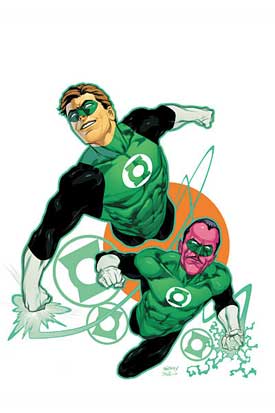 |
| Hal Jordan and Arch Nemesis Sinestro |
Green Lantern comic books and products easily sell better than Wonder Woman goods. Yet, DC Comics continues to artificially promote Wonder Woman as one of the company’s most important characters, even when evidence shows this to be a mistake. I don’t understand why DC Comics willingly castrates promising properties like Green Lantern in order to continuously reaffirm the superiority of Batman, Superman and Wonder Woman. This is a zero sum game vision where no place is given to other properties to shine.
Marvel Comics' Approach to Second String Characters
At Marvel Comics, a more organic way has evolved over the years. When
Wolverine was clearly shown as a driving force behind the
X-Men, he was given more publicity and visibility. This did not take away from the X-Men franchise. It only made it stronger. Similarly, when the X-Men became popular in 1975, Marvel Comics did not attempt to limit their reach in favour of Spider-man and the Fantastic Four, which were traditionally considered as more important to the publisher. When Frank Miller established
Daredevil as an author’s series in the early 1980s, after a few years of trial and error, Marvel Comics allowed his series to be a forum where creators could tell more mature stories with greater complexity than Spider-man, although Daredevil had always been considered a poor’s man Spider-man.
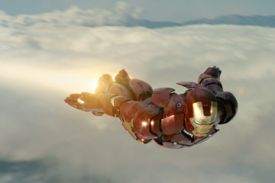 |
| The Invincible Iron Man |
Today, Iron Man is proving to be one of Marvel Comics new stars which reaches the minds and imagination of the public, in a way Spider-man, the X-Men nor the Fantastic Four ever did. Over at DC Comics, the publisher cannot make up its mind and figure out how to profit from the rich lore and potential offered by Green Lantern. Instead, it keeps Green Lantern as a property on a tight leash, instead of releasing Green Lantern upon the public as the major myth maker and property it really is.
Last Updated: March 3, 2025 - 20:40









